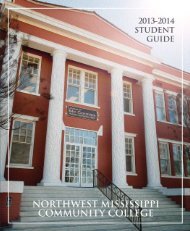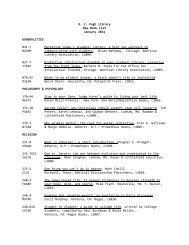Coping with Seven Disruptive Personality Types in the Classroom
Coping with Seven Disruptive Personality Types in the Classroom
Coping with Seven Disruptive Personality Types in the Classroom
Create successful ePaper yourself
Turn your PDF publications into a flip-book with our unique Google optimized e-Paper software.
play equally escapist video games. In short, <strong>the</strong>y will do virtually anyth<strong>in</strong>g ra<strong>the</strong>r thanplunge <strong>in</strong>to <strong>the</strong> drudgery of <strong>the</strong> assignment. Often, this form of escapism cont<strong>in</strong>ues for daysor weeks until <strong>the</strong> reality of <strong>the</strong> deadl<strong>in</strong>e approaches and <strong>the</strong> student is <strong>in</strong> a virtual panic,cramm<strong>in</strong>g o meet it.When <strong>the</strong>rapists have po<strong>in</strong>ted out to such students <strong>the</strong> ways <strong>in</strong> which <strong>the</strong>ir procrast<strong>in</strong>at<strong>in</strong>gseem to represent unconscious feel<strong>in</strong>gs of rebellion and defiance aga<strong>in</strong>st <strong>the</strong> unpleasantacademic demands made by <strong>the</strong>ir <strong>in</strong>structors, <strong>the</strong>ir first reactions are usually defensive andskeptical. Upon closer exam<strong>in</strong>ation of <strong>the</strong> sequence of choices and decisions that underm<strong>in</strong>e<strong>the</strong>ir ability to work on <strong>the</strong>ir assignments, however, <strong>the</strong>se students often grasp how <strong>the</strong>irdefiance tripped <strong>the</strong>m up, and <strong>the</strong>y f<strong>in</strong>d ways to resist <strong>the</strong>ir rebellious pleasure seek<strong>in</strong>g andeven come to view <strong>the</strong>ir difficult assignments <strong>in</strong> a more positive light.Part of this process often <strong>in</strong>volves shedd<strong>in</strong>g light on how much <strong>the</strong>y resented, as children,<strong>the</strong>ir parents’ sometimes-authoritarian demands that <strong>the</strong>y carry out unpleasant tasks like,yes, carry<strong>in</strong>g out <strong>the</strong> garbage. If it has not occurred to you as of yet, consider now <strong>the</strong> factthat <strong>in</strong>structors, like <strong>the</strong>rapists, are often targeted <strong>with</strong> many of <strong>the</strong> same <strong>in</strong>tense feel<strong>in</strong>gs,both negative and positive, that students have long harbored toward <strong>the</strong>ir parents. Thepsychoanalytic term for this is, of course, “transference.” Therefore, <strong>in</strong>structors can onlyhope that <strong>the</strong>y will have only students who were raised <strong>in</strong> happy, nurtur<strong>in</strong>g families! Most ofus will have to deal <strong>with</strong> students who were raised <strong>in</strong> less-than-perfect households and whoexhibit behaviors learned <strong>in</strong> those sett<strong>in</strong>gs.Now that we have a more dynamic understand<strong>in</strong>g of <strong>the</strong> nature of passive-aggressiveprocrast<strong>in</strong>ation, what can <strong>in</strong>structors do about it? First, discuss<strong>in</strong>g <strong>the</strong> subject <strong>with</strong> yourstudents might lead to some <strong>in</strong>terest<strong>in</strong>g <strong>in</strong>sights on how to motivate some of <strong>the</strong>m toovercome <strong>the</strong>ir pattern of procrast<strong>in</strong>ation. At <strong>the</strong> same time, <strong>in</strong>structors might mention that<strong>the</strong> counsel<strong>in</strong>g or psychological service on campus is an excellent resource for deal<strong>in</strong>g <strong>with</strong>such problems.Some <strong>in</strong>structors who are aware of <strong>the</strong> prevalence of procrast<strong>in</strong>ation let <strong>the</strong>ir students knowthat <strong>the</strong>y will periodically but <strong>with</strong>out notice give unscheduled quizzes, add<strong>in</strong>g a cautionarystatement that <strong>the</strong> students should keep up on <strong>the</strong>ir read<strong>in</strong>gs <strong>in</strong> order to be prepared for<strong>the</strong>se assessments. Even if this does not solve <strong>the</strong> problem, it will at least hold <strong>the</strong> offend<strong>in</strong>gstudents accountable for <strong>the</strong>ir behavior.A friendlier tack would be to compliment and show consistent <strong>in</strong>terest <strong>in</strong> <strong>the</strong> progressstudents make <strong>in</strong> submitt<strong>in</strong>g <strong>the</strong>ir assignments and keep<strong>in</strong>g abreast of <strong>the</strong>ir read<strong>in</strong>g. Ofcourse, students need to know that you are not only <strong>in</strong>terested <strong>in</strong> <strong>the</strong> punctuality of <strong>the</strong> workbut, even more important, also <strong>in</strong> <strong>the</strong> quality of <strong>the</strong>ir scholarship. If compliments are19


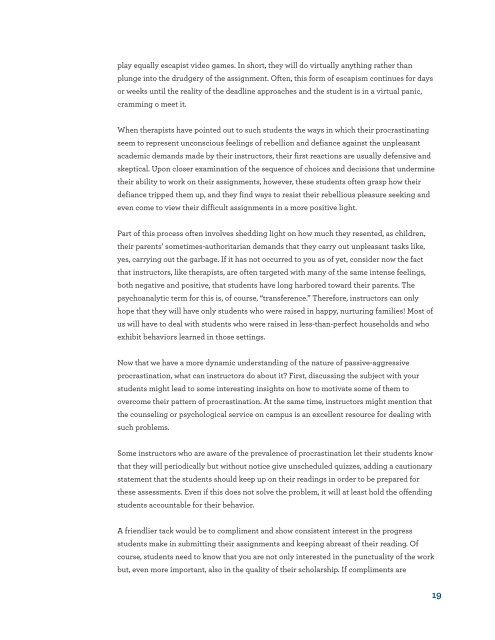

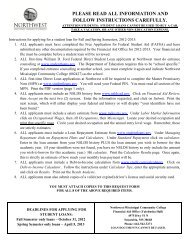
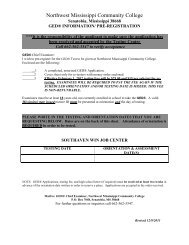



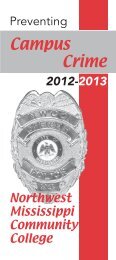

![Pro-Dental Hygiene [Major Code T34] - Northwest Mississippi ...](https://img.yumpu.com/35524032/1/190x149/pro-dental-hygiene-major-code-t34-northwest-mississippi-.jpg?quality=85)

